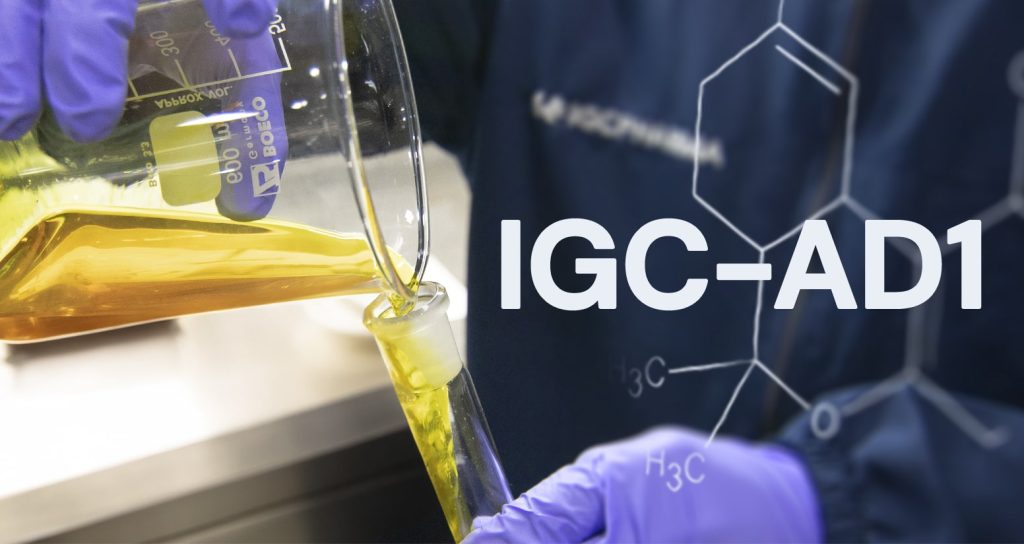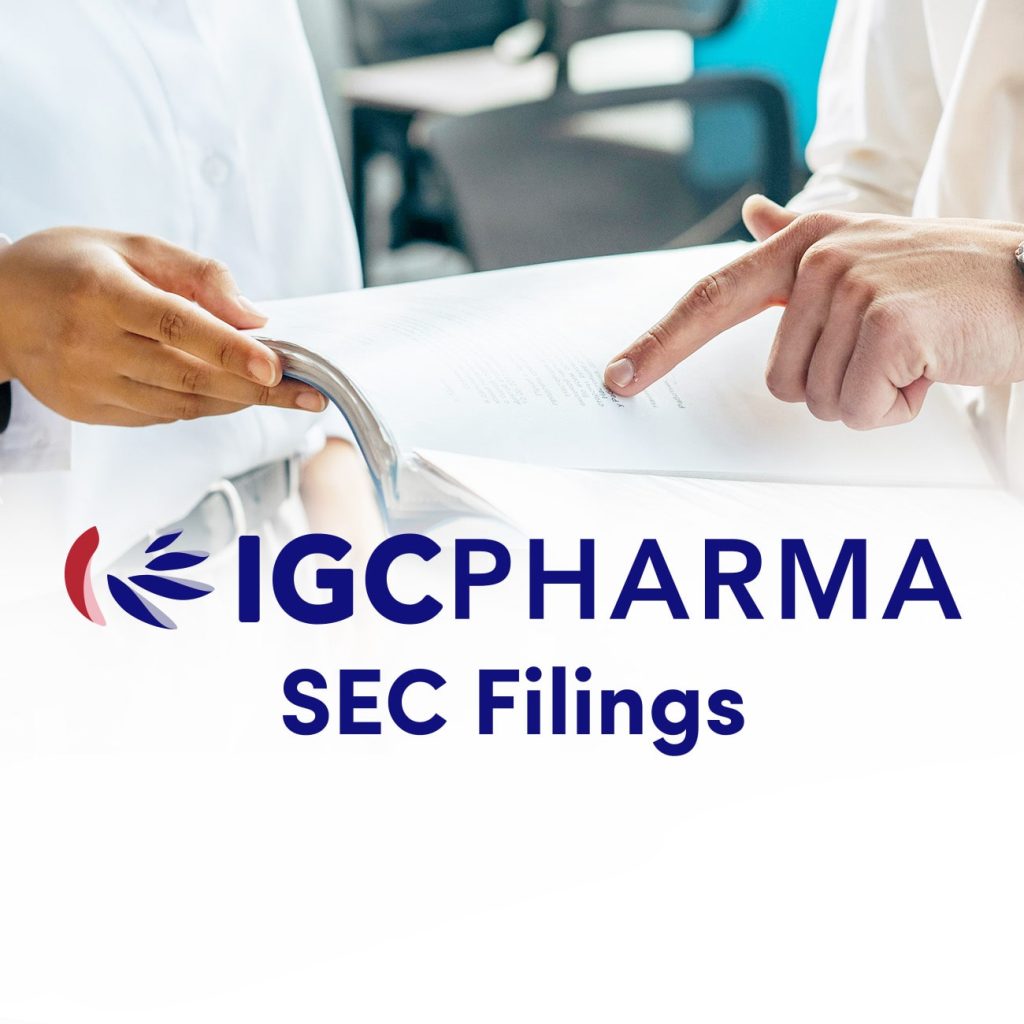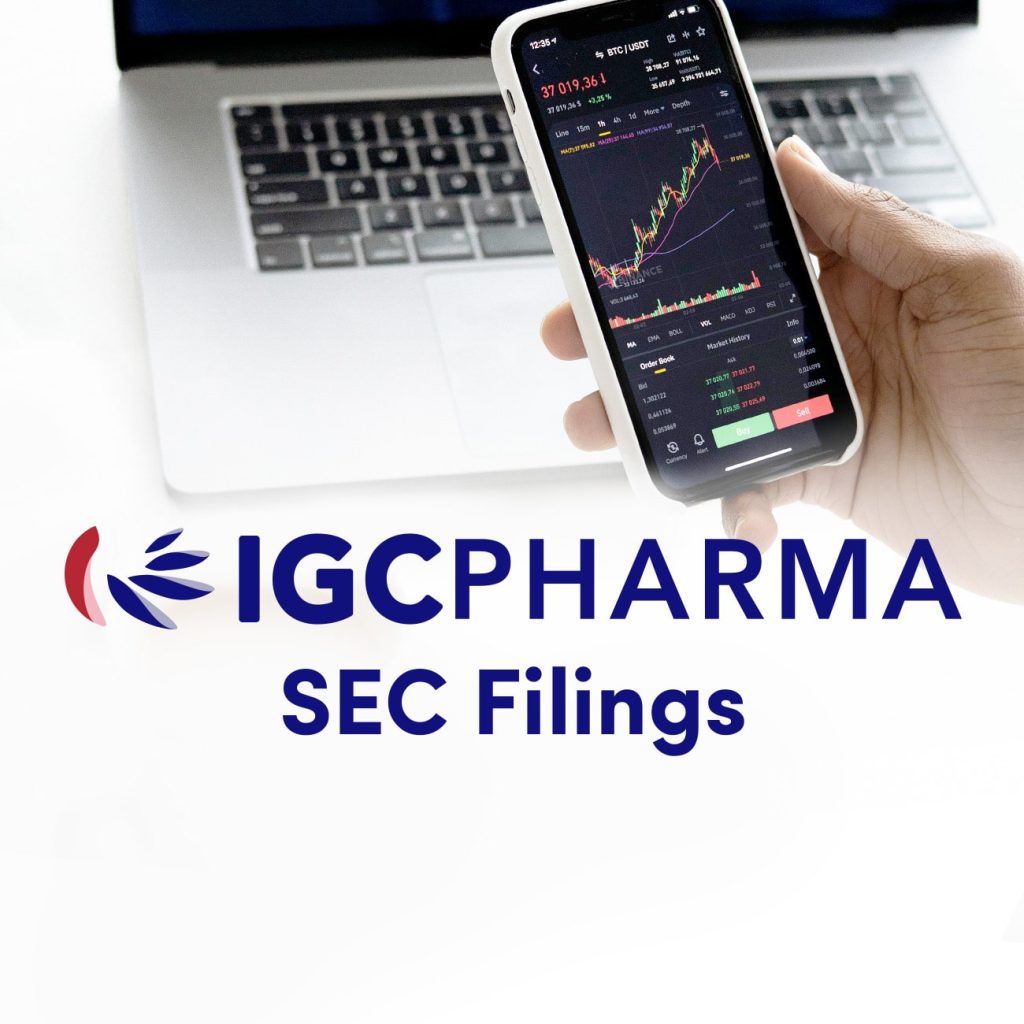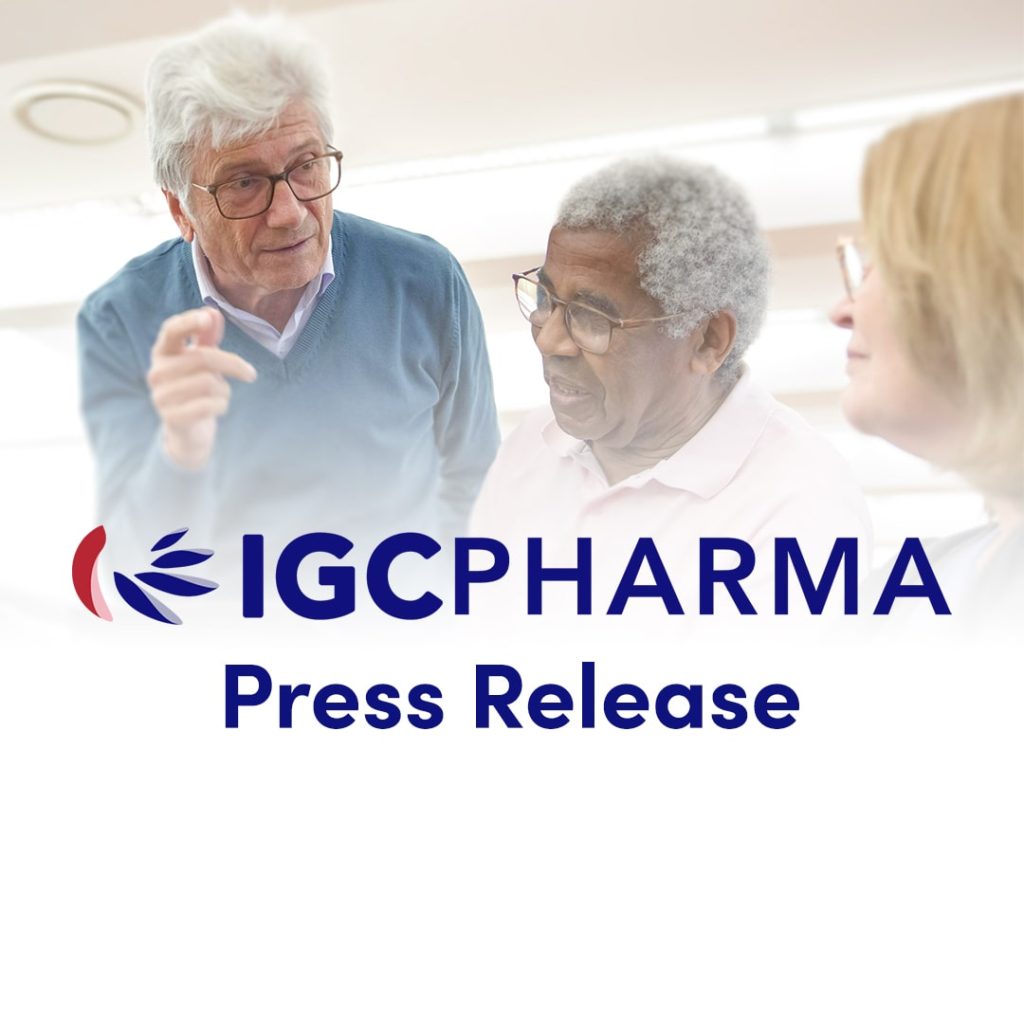
-Study Deepens Understanding of Treatments for Alzheimer’s Patients, Enabling More Effective Treatments –
POTOMAC, Md., June 10, 2024—IGC Pharma, Inc (NYSE American: IGC) (“IGC” or the “Company”), today announced the publication of a significant research article in the European Society of Medicine Journal. The study investigates the effects of CYP2C9 polymorphisms on the pharmacokinetics (“PK”) of delta-9-tetrahydrocannabinol (“THC”) and its active metabolite in Alzheimer’s disease (“AD”) patients.
The publication is titled “A study on CYP2C9 polymorphism in Puerto Rican Alzheimer’s Patients and its role in the Pharmacokinetics of ∆-9-tetrahydrocannabinol” and is available at https://esmed.org/MRA/mra/article/view/5380.
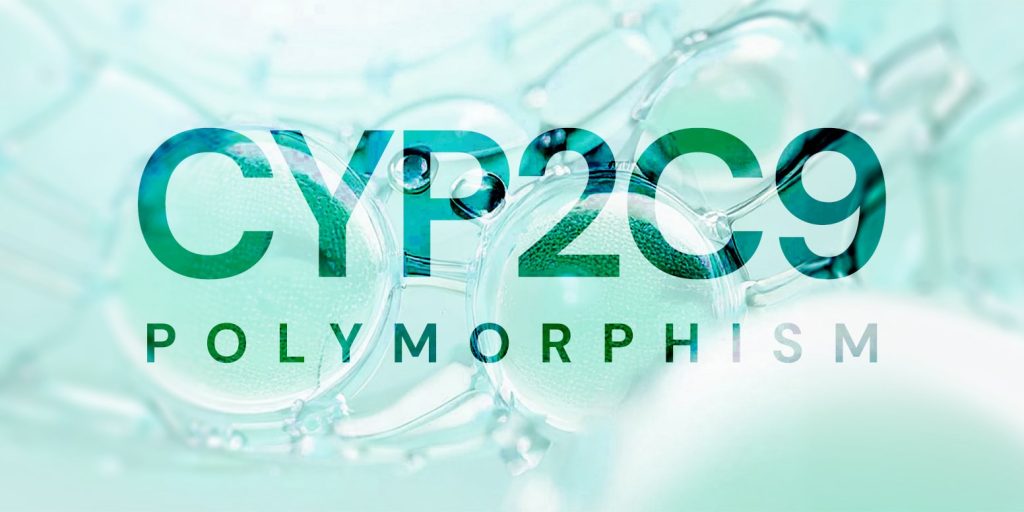
The article highlights the importance of understanding genetic variations in CYP2C9, an enzyme crucial for drug metabolism, and its impact on the efficacy and safety of treatments involving THC. IGC Pharma’s leading drug candidate IGC-AD1 was tested in a Phase 1 multiple ascending dose (“MAD”) trial with a Puerto Rican population. The study examined the effect of CYP2C9 polymorphisms on THC metabolism in AD patients. Key findings revealed significant variations in THC and OH-THC half-life among different CYP2C9 phenotypes, suggesting the need for personalized dosing strategies in AD patients.
The publication of the article aligns with IGC Pharma’s commitment to the inclusion of underrepresented populations in clinical research developing innovative Alzheimer’s therapies. Puerto Rico, with an elevated AD rate of 12% compared to 10.7% in the continental US, was chosen to ensure comprehensive data collection and improve the accessibility of effective therapies.
Ram Mukunda, CEO of IGC Pharma, commented, “We are very pleased to announce the publication in the prestigious European Society of Medicine journal. This publication is a testament to our dedication to pioneering research in Alzheimer’s disease. Understanding the genetic factors influencing drug metabolism is critical for developing safe and effective treatments. We are proud to contribute to the scientific community with this important study, reinforcing our commitment to enhancing patient care and delivering shareholder value through scientific innovation.”
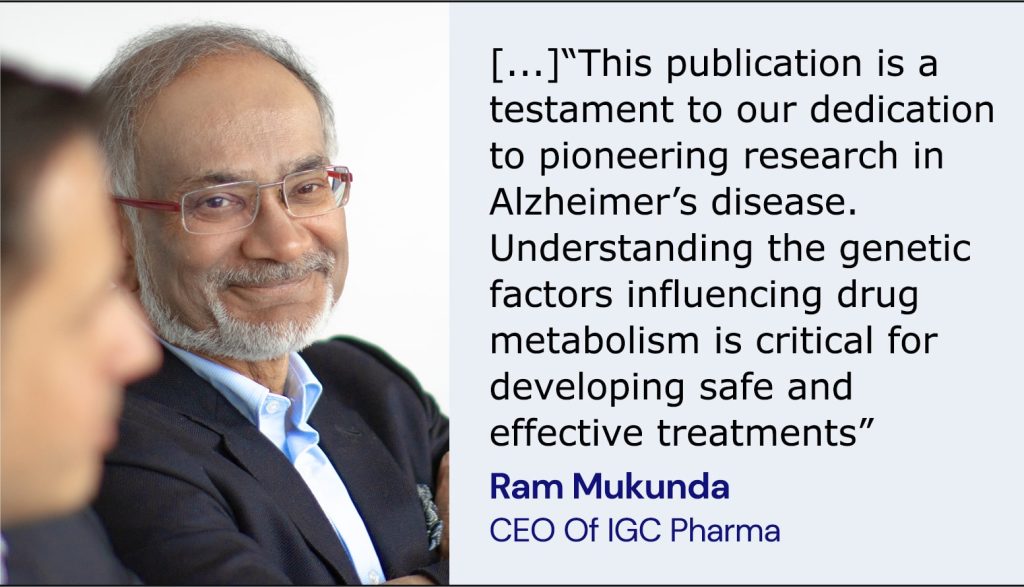
Dr. Jagadeesh S. Rao, the lead scientist of the study, stated, “Our findings emphasize the critical need for personalized medicine in treating Alzheimer’s disease. The significant variability in THC metabolism due to CYP2C9 polymorphisms highlights the importance of considering genetic profiles when dosing. This research paves the way for more tailored therapeutic approaches, potentially improving outcomes for AD patients.”
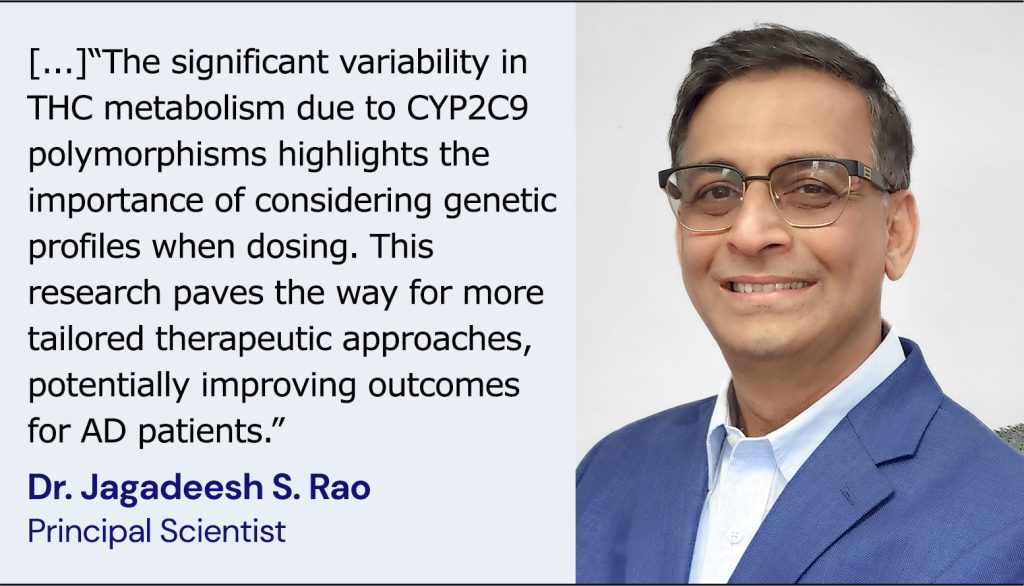
IGC Pharma is currently conducting a Phase 2 trial with IGC-AD1, a partial CB1r agonist with anti-neuroinflammatory properties and an inflammasome inhibitor, to treat agitation from symptoms of dementia caused by Alzheimer’s. Neuroinflammation, neurotransmitter imbalance, loss of CB1r, and inflammasome-3 have been implicated as causes of agitation and aggression in patients suffering from Alzheimer’s disease. IGC-AD1 contains THC as one of its two active pharmaceutical agents, the principal psychoactive cannabinoid found in Cannabis. IGC-AD1 is a first-of-its-kind THC-based-formulation undergoing a formal Phase 2 clinical trial in Alzheimer’s disease.
About IGC Pharma, Inc.
IGC Pharma Inc. (“IGC”) is focused on Alzheimer’s disease, developing innovative solutions to address this devastating illness. The Company’s mission is to transform the landscape of Alzheimer’s treatment with a robust pipeline of five promising drug candidates. IGC-AD1 and LMP target the hallmarks of Alzheimer’s disease, including neuroinflammation, Aβ plaques, and neurofibrillary tangles. IGC-AD1 is undergoing a Phase 2 clinical trial for Agitation in dementia associated with Alzheimer’s (clinicaltrials.gov, NCT05543681).
TGR-63 disrupts the progression of Alzheimer’s by targeting Aβ plaques. IGC-M3, currently in preclinical development, aims to inhibit the aggregation of Aβ plaques, potentially impacting early-stage Alzheimer’s. IGC-1C, also in preclinical stages, targets tau protein and neurofibrillary tangles, representing a forward-thinking approach to Alzheimer’s therapy. In addition to its drug development pipeline, IGC Pharma seeks to leverage artificial intelligence (“AI”) for Alzheimer’s research. Their AI projects encompass various areas, including clinical trial optimization and early detection of Alzheimer’s.
Forward-looking Statements
This press release contains forward-looking statements. These forward-looking statements are based largely on IGC Pharma’s expectations and are subject to several risks and uncertainties, certain of which are beyond IGC Pharma’s control. Actual results could differ materially from these forward-looking statements as a result of, among other factors, the Company’s failure or inability to commercialize one or more of the Company’s products or technologies, including the products or formulations described in this release, or failure to obtain regulatory approval for the products or formulations, where required, or government regulations affecting AI or the AI algorithms not working as intended or producing accurate predictions; general economic conditions that are less favorable than expected; the FDA’s general position regarding Cannabis- and hemp-based products; and other factors, many of which are discussed in IGC Pharma’s U.S. Securities and Exchange Commission (“SEC“) filings. IGC Pharma incorporates by reference the human trial disclosures and Risk Factors identified in its Annual Report on Form 10-K filed with the SEC on July 7, 2023, as if fully incorporated and restated herein. Considering these risks and uncertainties, there can be no assurance that the forward-looking information contained in this release will occur.
Contact:
Investors
IMS Investor Relations
Walter Frank/Rosalyn Christian
(203) 972-9200
Media
JVPRNY
Janet Vasquez
(212) 645-5498

